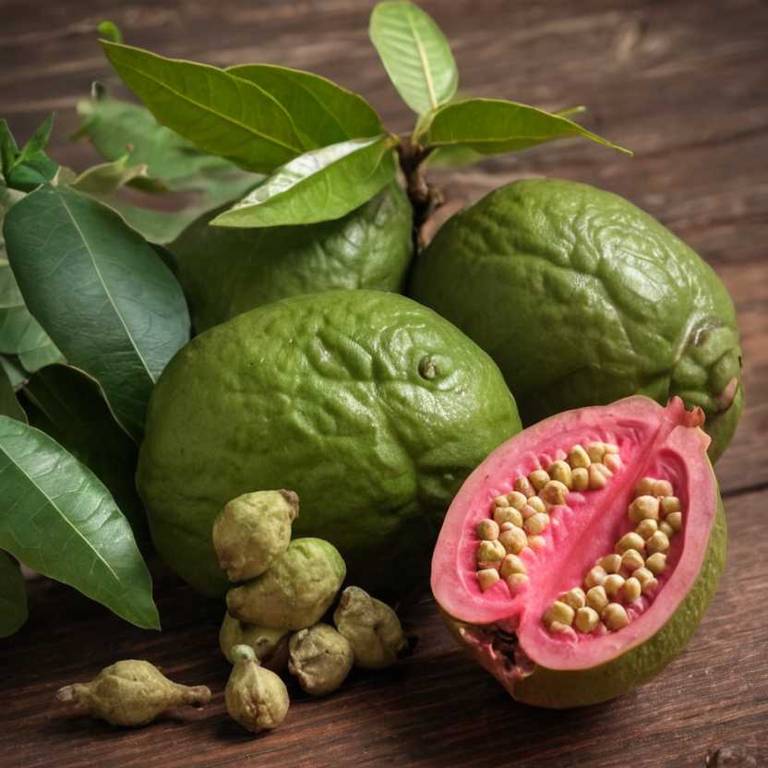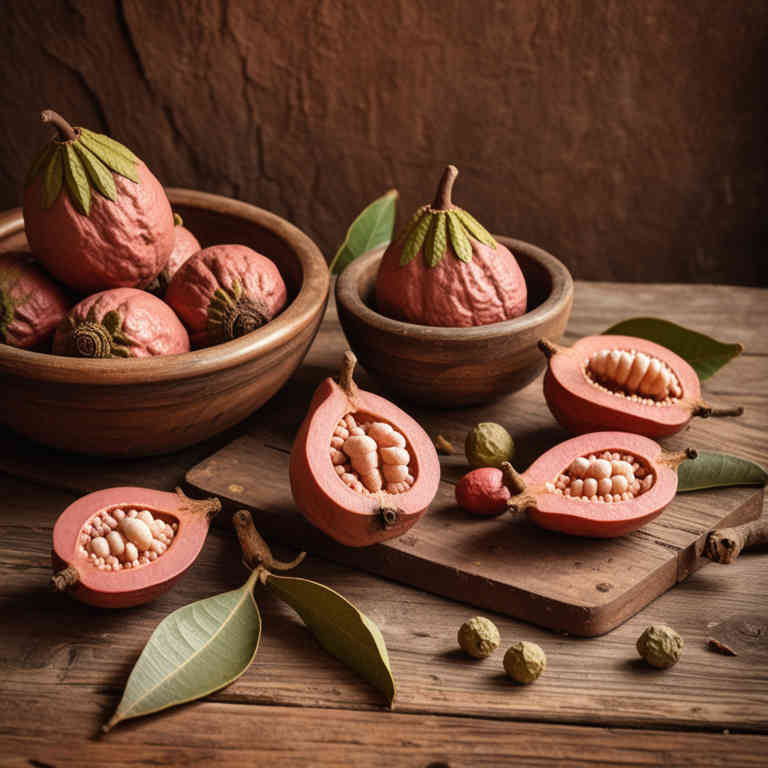10 Best Psidium Guajava Preparations

The best medicinal preparations of Psidium guajava are teas, decoctions, tinctures, juices, and capsules, each offering unique benefits for health.
Tea made from dried guava leaves is commonly used to aid digestion and reduce inflammation.
Decoctions involve boiling the leaves or fruit to extract their active compounds, often used for respiratory and skin conditions.
Tinctures provide a concentrated form of the herb, useful for quick absorption of its medicinal properties.
Juices from the fruit are rich in antioxidants and are consumed for their refreshing and health-boosting effects.
Capsules offer a convenient and standardized way to incorporate guajava into daily wellness routines.
Below there's a list of the 10 best herbal preparations of psidium guajava for medicinal purposes.
- 1. Teas
- 2. Decoctions
- 3. Tinctures
- 4. Juices
- 5. Capsules
- 6. Lozenges
- 7. Oils
- 8. Creams
- 9. Syrups
- 10. Mucillages
1. Teas
Psidium guajava teas is commonly used to treat digestive issues, respiratory infections, and skin conditions due to its antimicrobial and anti-inflammatory properties.
The most common medicinal uses of this herbal preparation include alleviating symptoms of coughs, sore throats, and gastrointestinal disorders such as indigestion and diarrhea. It is also used topically to treat wounds, acne, and other skin irritations. The bioactive constituents responsible for these effects include flavonoids, tannins, phenolic acids, and essential oils, which exhibit antioxidant, antimicrobial, and anti-inflammatory activities.
These compounds contribute to the plant's ability to support immune function and promote healing.

2. Decoctions
Psidium guajava decoctions is commonly used to treat digestive issues, respiratory infections, and skin conditions.
These decoctions are often prepared by boiling the leaves, flowers, or fruits of the guava plant in water to extract their medicinal properties. The most common ailments treated with this preparation include diarrhea, coughs, sore throat, and inflammation. Bioactive constituents such as flavonoids, tannins, and vitamin C contribute to its antimicrobial, anti-inflammatory, and antioxidant effects.
These compounds help reduce inflammation, combat bacterial and viral infections, and support overall immune function.

3. Tinctures
Psidium guajava tinctures is commonly used to treat digestive issues, respiratory infections, and skin conditions due to their antimicrobial and anti-inflammatory properties.
These tinctures are often employed to alleviate symptoms of coughs, sore throats, and gastrointestinal discomfort. The most common medicinal uses include addressing colds, flu, and digestive disorders such as indigestion and diarrhea. Bioactive constituents like flavonoids, phenolic acids, and essential oils contribute to its therapeutic effects.
These compounds possess antioxidant, antibacterial, and anti-inflammatory properties that support the plant's traditional medicinal applications.

4. Juices
Psidium guajava juices is commonly used to treat digestive issues, respiratory infections, and skin conditions.
It is widely utilized for its antimicrobial, antioxidant, and anti-inflammatory properties. The juice is often consumed to alleviate symptoms of coughs, colds, and sore throats.
It is also used topically to heal wounds and reduce inflammation. The most common medicinal uses include treating gastrointestinal disorders, respiratory ailments, and skin infections.
The bioactive constituents of Psidium guajava juices that contribute to its medicinal properties include flavonoids, phenolic compounds, tannins, and vitamin C. These compounds exhibit antimicrobial, antioxidant, and anti-inflammatory effects, which support its traditional use in treating various health conditions.

5. Capsules
Psidium guajava capsules is commonly used to support digestive health, reduce inflammation, and manage symptoms of respiratory and urinary tract infections.
These capsules are widely utilized for treating ailments such as indigestion, diarrhea, coughs, and urinary tract infections due to their antimicrobial and anti-inflammatory properties. The bioactive constituents responsible for these effects include flavonoids, tannins, phenolic acids, and vitamin C, which contribute to the plant's antioxidant, antiviral, and antibacterial activities. Additionally, the presence of essential oils and glycosides enhances its therapeutic potential.
Overall, Psidium guajava capsules are valued for their broad-spectrum health benefits and traditional medicinal applications.

6. Lozenges
Psidium guajava lozenges is commonly used to alleviate symptoms of respiratory infections, sore throat, and cough due to their antimicrobial and anti-inflammatory properties.
These lozenges are often employed to treat ailments such as colds, bronchitis, and pharyngitis by soothing irritated mucous membranes and reducing inflammation. The medicinal effects are attributed to bioactive constituents like flavonoids, phenolic acids, and essential oils, which exhibit antioxidant, antiviral, and antibacterial activities. Additionally, the presence of vitamin C and tannins contributes to its immune-boosting and healing properties.
This herbal preparation is valued for its natural approach to managing mild to moderate respiratory and throat-related conditions.

7. Oils
Psidium guajava oils is commonly used to treat skin conditions, respiratory issues, and digestive disorders.
The oil is often applied topically for its antimicrobial and anti-inflammatory properties, making it effective for treating acne, fungal infections, and wounds. It is also used in aromatherapy to alleviate symptoms of colds, coughs, and bronchitis due to its expectorant effects. The bioactive constituents responsible for these medicinal properties include compounds like terpenes, phenolic acids, and flavonoids, which exhibit antioxidant, antiseptic, and anti-inflammatory activities.
Additionally, the oil contains essential oils such as cineole and limonene, which contribute to its therapeutic effects.

8. Creams
Psidium guajava creams is commonly used to treat skin conditions and promote wound healing due to the medicinal properties of the guava leaf.
These creams are often applied to alleviate symptoms of eczema, psoriasis, and fungal infections such as athlete's foot. The most common medicinal uses include reducing inflammation, soothing irritations, and accelerating the healing process of minor cuts and burns. The bioactive constituents responsible for these effects include flavonoids, tannins, and phenolic compounds, which have antioxidant, antimicrobial, and anti-inflammatory properties.
These compounds work synergistically to enhance the therapeutic benefits of the herbal preparation.

9. Syrups
Psidium guajava syrups is commonly used to treat respiratory and digestive ailments, as well as to support immune function.
The syrup is often employed for coughs, colds, sore throats, and gastrointestinal issues such as indigestion and inflammation. It is also used in traditional medicine to alleviate symptoms of asthma and bronchitis. The medicinal properties of guajava syrups are attributed to bioactive constituents like flavonoids, tannins, and phenolic acids, which have antimicrobial, anti-inflammatory, and antioxidant effects.
These compounds help reduce inflammation, combat infections, and support overall immune health.

10. Mucillages
Psidium guajava mucillages is commonly used to treat digestive issues, respiratory conditions, and skin ailments due to its soothing and healing properties.
The mucillages are often employed to alleviate symptoms of gastritis, ulcers, and coughs, as well as to promote wound healing and reduce inflammation. They are also used in traditional medicine to manage diabetes by helping regulate blood sugar levels. The bioactive constituents responsible for these effects include polysaccharides, tannins, flavonoids, and phenolic compounds, which exhibit antioxidant, anti-inflammatory, and antimicrobial activities.
These components contribute to the mucillages' ability to protect mucous membranes and support overall health.
